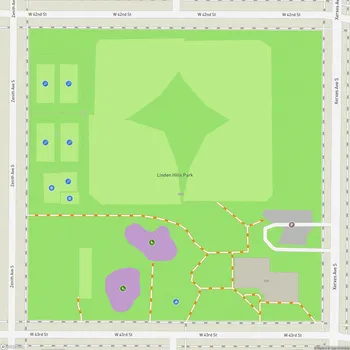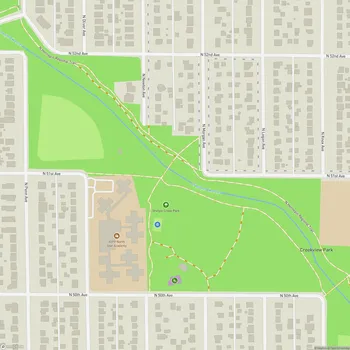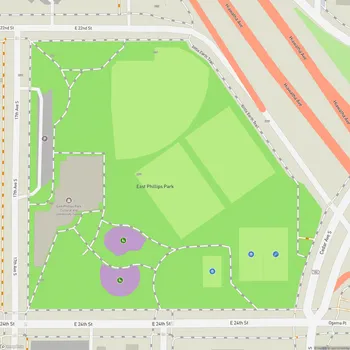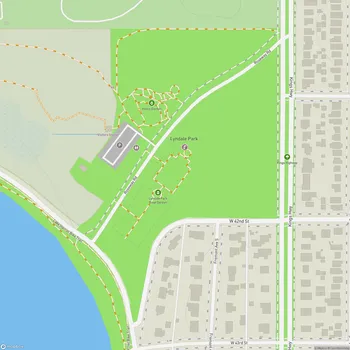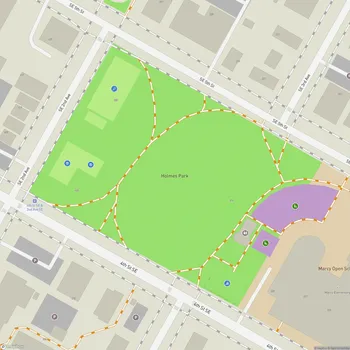Folwell Park
Interactive Park Map
About Folwell Park
History and Location
Set in North Minneapolis, Folwell Park stretches across 27 acres of green space that's become a neighborhood haven. Dating back to 1925, the park bears the name of William Watts Folwell, the first president of the University of Minnesota and a significant figure in Minneapolis history.
The park has a unique layout with an upper section that maintains its natural beauty and a lower portion dedicated to all things recreational. It's a little oasis of green surrounded by the city's urban landscape and cozy residential areas.
Outdoor Amenities
If you're into sports, Folwell offers plenty of options. The park features baseball fields, a football field, a soccer field, and newly renovated tennis courts that you can easily access from the side street. There's also a basketball court for pickup games or solo practice.
Feel like taking a stroll? Paved walking and biking paths meander around the park, with benches strategically placed for when you need a breather. The paths are well-lit after sunset, making evening walks possible even as the days get shorter. And when winter blankets Minneapolis, the park transforms to offer ice skating opportunities.
Playgrounds and Water Features
Got kids? They'll love the two separate playgrounds with equipment designed for different age groups. Little ones have their own special space in the tot lot, where they can play safely.
During the summer months (Memorial Day through Labor Day), the wading pool opens up for splashing around. While it's not deep, it's ideal for younger children to cool off when the Minnesota summer heats up. The pool is kept clean and inviting throughout the season.
Recreation Center
The heart of community activity is the Folwell Recreation Center. This air-conditioned haven includes a gymnasium, craft room, multipurpose room, and a computer lab - offering something for everyone regardless of whether you're looking to break a sweat or exercise your mind.
Inside, you'll find ping pong tables and foosball for some friendly competition. The center is kept impressively clean, and the staff are known for being helpful and respectful while keeping an eye on activities. There are comfortable places to sit, read, or have a snack, plus gender-neutral restrooms that are regularly maintained.
Picnic and Community Spaces
Planning a gathering? The park's picnic areas come equipped with benches and grills, great for family reunions or casual meetups. These spots are well-kept and ready for your next outdoor meal. There's even a Little Free Library where you can grab a book to enjoy under a shady tree.
Over the years, Folwell Park has become much more than a park and a place where the community comes together for celebrations, memorials, and everything in between. And don't worry about parking; there's a large lot that makes visiting hassle-free.
Recent and Upcoming Improvements
The Minneapolis Park and Recreation Board (MPRB) hasn't been resting on its laurels. Recent years have seen significant investments in Folwell, with upgrades to tennis courts, lighting, and pathways. They've also added accessibility features to make sure everyone can enjoy what the park has to offer.
Excitingly, an all-wheel park is in the works, designed for biking, skateboarding, and other wheeled activities. This addition aims to make Folwell a go-to destination for outdoor enthusiasts, while thoughtfully incorporating naturalized plantings for stormwater management and ecological health.
Community Impact
Folwell Park functions as a community gathering place with year-round programming, camps, and events that bring neighbors together. The park also participates in the summer meals program, providing free weekday dinners to children under 18 during school breaks.
Dog owners appreciate the spacious fields for walking their four-legged friends (remember to bring a leash!). With plenty of room to roam and natural areas to explore, it's a favorite spot for both pets and their humans to get some fresh air and exercise.
All Features & Facilities
Active Recreation
Nature & Wildlife
Water Features & Activities
Visitor Services
Food & Gathering
Photo Gallery
ParkMagnet Score
Great Park
Park Size
Opening Hours
Weather
Top Restaurants Near Folwell Park
TAP IN Kitchen & Cocktails
0.8 miles2618 Lowry Ave N, Minneapolis, MN 55411
A neighborhood restaurant serving delicious comfort food including brisket and vegan options in a cozy atmosphere.
Pair of Dice Pizza
1.0 miles2715 W Broadway, Minneapolis, MN 55411
Low-key pizzeria serving traditional pizzas, rib tips, chicken wings, and homemade cheesecake in a casual setting.
The Camden Social
1.1 miles4601 N Lyndale Ave, Minneapolis, MN 55412
Elegant neighborhood spot serving elevated American comfort food with live music and craft cocktails.



